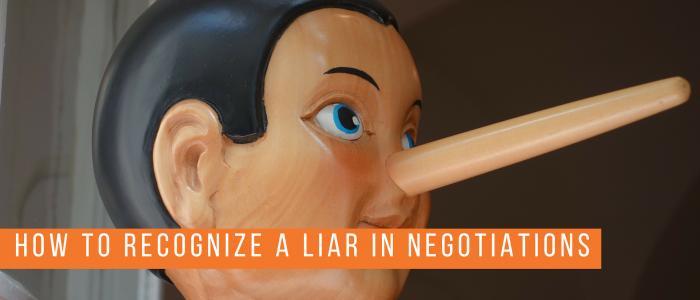How to recognize a liar in negotiations
How do you recognize a liar in a negotiation? Many liars prepare their lies well. They develop a story. Liars who have to spontaneously come up with a lie are more conspicuous. But neither can hide certain signals.
Demonstrative honesty – an indication of dizziness
Some liars fixate you with their eyes because they believe that a long direct eye contact sends signals of sincerity and attention. But in laid-back conversations you do not fix your opponent like a prey, but also look elsewhere to simply reconsider new conversation content. Excessive and detailed justifications may also indicate a fraud. It is equally suspicious when someone often repeats statements like “honest”, “that’s really so” or “believe me”.
Recognize sudden behavior changes
Liars – at least most of them – feel anxious and guilty about the lie. As a result, they subconsciously change their previous behavior quite suddenly – with which they betray themselves. Either they become nervous and scratch themselves, change body language and facial expression or change their voice or speech melody. Just as well, it may be that a counterpart is suddenly conspicuously relaxed. Of course, the liar himself realizes that he may be noticeable and tries to behave as inconspicuously as possible. You can often tell by the fact that the body language is reduced and he suddenly becomes cautious or stiff. He focuses on the lie and wants to hide. What to look for: He or she suddenly changes the behavior. So someone can talk unusually loud because he wants to announce the truth – which is not a truth. Conversely, someone else can talk unusually softly, as if he has something to hide.
Do not confuse uncertainty with lies
There are many myths about liars. Examples:
- “Liars often speak in a louder voice and are quick to change the topic of the conversation.”
- “Liars often scratch their heads or neck and look in a certain direction.”
However, the behavior described above can simply be a sign of uncertainty. Therefore, observe the other’s behavior in the context of the conversation, the topics, facts and circumstances.
The trick with the small talk
Conduct a totally non-binding and harmless small-talk with the other person, so that the person you are talking to relaxes. So you get a small impression of how the other person behaves relaxed. If he suddenly changes his behavior during the negotiation, he becomes stiffer or inconspicuous, responds slower or faster, a lie can hide behind it. Most liars have something in common: They do not become more noticeable or louder, but rather tense and quieter.
If you suspect that someone lies to you, just switch to small-talk and talk about something casual. The honest will confuse the change of subject. He will endeavor to return to the old conversation thread. The liar, on the other hand, is grateful and can relax without noticing anything.
Ask control questions
When you ask questions whose answers you know and the other person tells you the truth, you get a picture of how the person behaves, if he is honest.
Silence
If you don’t answer directly for once and just keep silent for a few seconds and look your counterpart in the eye, this will most likely make him insecure. For example, by looking away or suddenly breaking the silence and trying to justify himself. The honest one would stay relaxed and ask something like “What are you thinking about?
Time
The longer and the more the liar tries to cover up his dizziness, the more unnatural, mocked and tense he appears.
Preparation is everything
There is no general recipe. However, you can sensitize yourself and form an opinion on your counterpart from the multitude of facts that are considered in a negotiation. Important and often neglected is a good preparation for a negotiation. Have you asked important questions in advance, such as:
- Do you usually know the market positioning / dependence of your negotiating partner?
- Do you usually use concrete key figures in your negotiation?
- Have you prepared a specific agenda for the appointment?
- Which influencing factors on the price do you usually include in the negotiation?
- Or which negotiating arguments have you prepared?



Comments are closed.